- Federal Grid Company – Ten-year results
- Operations overview
- Social responsibility and sustainable development
- Financial performance overview
- Corporate governance report
- Share capital
-
APPENDICES
- Information on compliance with the FCSM corporate code of conduct
- Implementation of the assignments of the president and the government of the Russian Federation
- Information on transactions performed by JSC Federal Grid Company in 2012, recognized by russian federation laws as interested party transactions, and which are subject to the approval of the company’s authorized management body
- Audit Commission Conclusion on the Audit of Operational and Financial Activities of Federal Grid Company for 2012
- 2013 investor calendar
HR policy
The Company’s HR Policy is an integrated system of HR management intended to ensure the Company’s investment attractiveness and to balance the optimal use of the employees’ performance results, the achievement of corporate strategic goals, and the provision of social benefits and guarantees in line with employees’ needs and expectations. One of the priorities of the Company’s HR Policy is rotating and retaining the quantitative and qualitative characteristics of personnel to ensure the reliable functioning and dynamic development of the power grid complex.
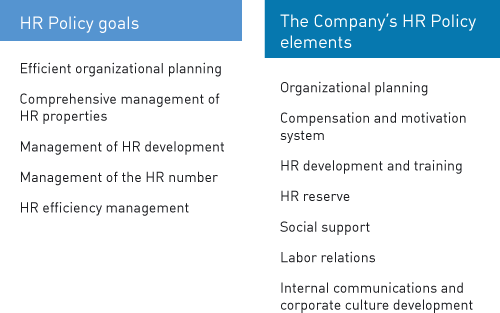
The number and qualitative composition of personnel
The Company’s total head count on 31 December 2012 was 25 103 employees. This figure represents a two percent increase in the total number of employees compared with the previous year, due to new job creation at corporate facilities (primarily to ensure the reliable operation of Olympic power facilities), and to implement the Company’s investment program.
On the whole, the number of employees grew 11% during the 2010-2012 period. This can be attributed to commissioning and energizing new UNEG facilities.
Changes in the Company’s head count over the three year period, employees

Personnel Structure by Category and Gender
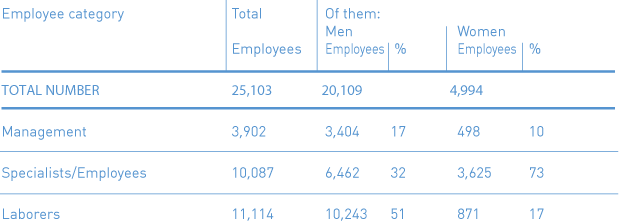
Personnel Structure by Education and Age
The Company sets strict requirements as to the education level and qualification of its employees and this pays off. For example, in 2012, the share of employees with higher education grew 2% (vis-?-vis 2011) and stood at 58%.
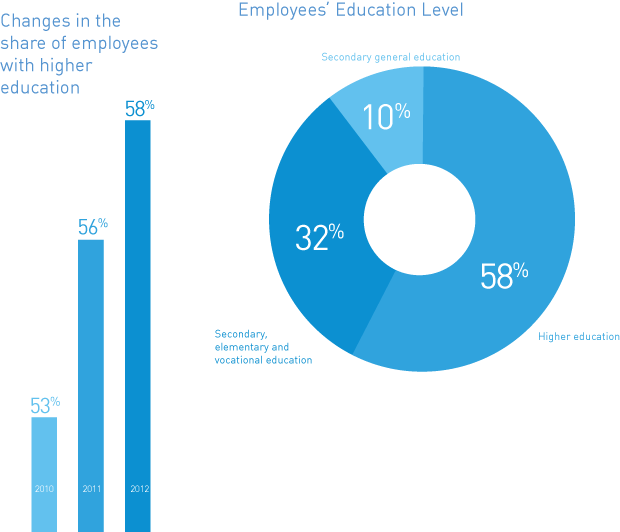
During recent years, the Company’s personnel structured broken down by age demonstrates a marked tendency towards a decrease in the number of middle-aged employees and a rejuvenation of manpower. During the 2010-2012 period, the average employee age fell from 39.8 to 38.8 years (as of 31 December 2012). The majority of the Company’s employees (56%) are people in their prime, meaning younger than 40 years old. Therefore, the Company maintains balance, attracting young and motivated employees and retaining experienced and highly qualified personnel, ensuring the transfer of professional knowledge and skills across generations.
Personnel Dynamics
The Company pays significant attention to managing the number of employees, as this management is instrumental to resolving the problem of filling key occupational positions and attracting young specialists. The Company actively cooperates with higher education establishments and schools. We concluded cooperation agreements with 45 Russian specialized education institutions. In 2012, the Company’s target scholarship program covered 86 students who will be offered job opportunities in different corporate divisions after graduation.
Number of participants in scholarship programs
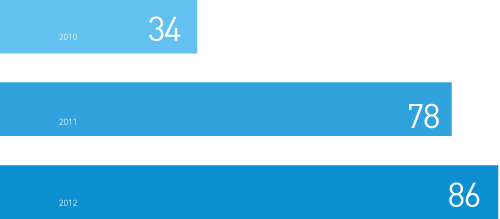
The Company’s staffing level is rather high, standing at 97% of its target strength as of 31 December 2012. From 2008 to 2012, the personnel flow index fell 1.5%, to 6%.
Monetary Incentives
The Company’s labor compensation system takes into account the position category, the performance results of the Company’s subsidiaries and divisions, and peculiarities of the regional labor markets, as well as the individual contributions of each employee. Furthermore, we have conducted a survey of compensation received by employees occupying key positions in competing companies, to prove that the compensation paid by the Company corresponds to the middle segment of the labor market. To maintain and increase monetary incentives, the Company’s subsidiaries perform an annual indexation of compensation (tariff rates) for employees, increasing compensation by the value of the actual growth in the consumer price index in the Russian Federation, which forms the basis for a stable increase in labor compensation.
Employee income structure

Changes in the average salary of the Company’s employees, RUR
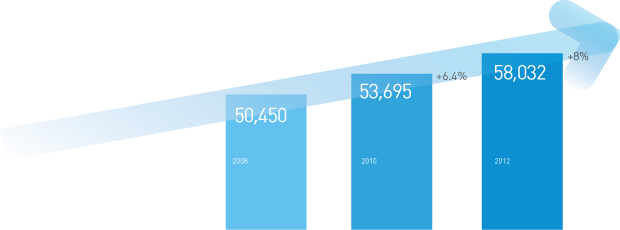
Employment benefits are another tool that the Company utilizes to improve employee motivation.
Forming an HR Reserve and Personnel Assessment
The Company’s concept of production and the technical HR reserve formation (which was developed in 2011) enabled the Company to comprehensively deal with the personnel reserve, forming a model of competencies used to determine the knowledge level, and managerial experience and skills of candidates for the reserve. This was complemented by developing the mentorship system.
During 2011-2012, personnel assessment initiatives for reserve candidates were implemented in all branches of the Company, while mentor training programs were implemented in the MES Center, MES North-West, and MES Volga. The total number of reserve candidates was 1 497 employees, with 478 of them enrolled in the tactical reserve and 143 employees participating in the mentor training program.
During the reporting year, the Company developed guidelines to assess the competencies of the Company’s branch management, looking for candidates for the PMES facility director. The assessment covered 29 employees from the Company’s HR reserve and 38 actual PMES directors. All assessment participants and PMES directors received feedback based on assessment results.
Personnel Training and Development
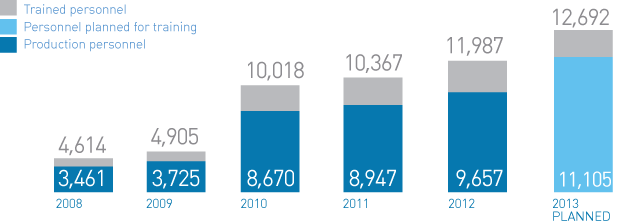
Corporate personnel’s strong professionalism is a key factor driving reliable UNEG operation.
In 2012, 11,987 employees took part in educational programs, including 9,657 operational employees. 6,713 employees took courses in the Company’s own Personnel Training Centers (PTCs).
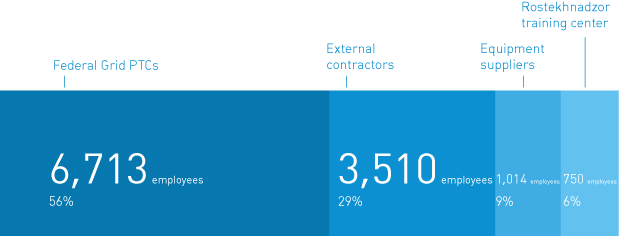
In all regions where Federal Grid Company operates, we have created a network of education centers. It allows us to successfully resolve the problem of forming an integrated educational space for our personnel and to increase the standards and enhance the quality of training.
All PTCs are equipped with training simulators developed for each branch, which imitate the dispatcher's operating and information complex. In 2013, we will complete construction of electric grid training areas with initial substation equipment, fragments of transmission lines (transformers, switches, disconnecting devices, and supports) and micro-processor panels of RP and EA.
In the reporting year, together with the Center of National Film, a film studio, we completed production of a series of educational films dedicated to the most topical activities of the Company.
The educational films allow us to standardize training, to improve quality. Moreover, they let us hold distance education and self-education.
In 2012, in line with our cooperation with Moscow Management School "Skolkovo", we implemented the following programs:
- Youth round tables held as a part of the St. Petersburg International Economic Forum – 2012 and the Baikal Economic Forum;
- Joint educational program “Integration of Federal Grid Company’s and IDGC Holding’s innovative development programs;
- Integrated program “Federal Grid Company’s Strategic Personnel Reserve”.
In 2012, we continued the personnel training project called Knowledge Days launched in April 2011. The project is aimed at comprehensively improving ongoing skills for corporate employees and our employees’ professional mobility, as well as on enhancing new employees’ ability to settle into the Company and creating a knowledge management system. 10,011 employees of the Company took part in the projects’ events; in 2013, IDGC Holding’s personnel joined the project.
As a part of the system of forming the integrated system of personnel training of Federal Grid Company and IDGC Holding, we undertook the following measures in 2012:
- Joint training within the framework of the Knowledge Days project, which is dedicated to reviewing and analyzing technological disturbances that have occurred due to personnel’s incorrect actions;
- Joint emergency protection training, which involved the personnel of Federal Grid Company’s PTC, operating and repair employees of MES Volga, MES Ural and IDGC Holding;
- Joint training related to fire protection, labor protection, preventing disturbances in the operations of transmission lines, and enhancing procurement activities, media relations and interactions with personnel.
Strengthening Corporate Culture
The Company’s corporate culture joins employees together as a united team, providing motivation for fruitful work, mobilizing their initiatives and facilitating communication. The Company has an established range of values which are essential for members of the corporate team, who are engaged in the major and complex business of supplying electric power to all Russian regions.
In 2012, which marks the Company’s 10th anniversary, significant attention has been paid to corporate culture development.
The Company has published the “Federal Grid Company. Ten Years” photo album, which contains works of the best Russian photographers. It was an initiative realized jointly with the Moscow Photography House. A jubilee exhibition and the presentation of the album took place 27 June 2012 in the Moscow Photography House. On the eve of the Power Engineers’ Day in December 2012, photographs from the album were exhibited in the Russian Parliament.

The “Dynasty” program launched by the Company in 2010 to foster labor traditions serves to familiarize children of employees with production facilities, and to organize drawing contests such as “Unified Grid – Unified Country”, a contest which has been organized for the children of Company employees, as well as for those of employees of JSC IDGC Holding. The program also helps to organize New Year’s festivities for children of Company employees.
The Company promotes healthy lifestyles, supporting sports and physical activities. In 2012, Company employees participated in Winter and Summer Olympics organized by Federal Grid Company. In October 2012, a second Chess Tournament (in memory of Mikhail Botvinnik) was held. The Tournament, attended by power industry professionals, was organized by the Company and JSC R&D Center of Federal Grid Company. Tournament participants included 26 teams representing Federal Grid Company and other grid companies.
Non-governmental Pension Programs
A non-governmental pension program for corporate employees was approved in 2004, to attract and retain the best industry professionals and to provide social support to employees, even after retirement.
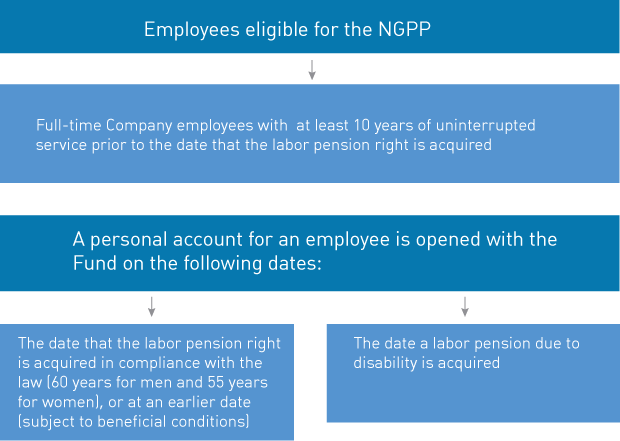
The number of employees who received non-governmental pensions funded by Federal Grid Company during the Program’s lifecycle was 3 628. In 2012, the Company transferred RUR320,735,413 to the Non-governmental Pension Fund of the Power Industry.
The Housing Program
Last year, the Company launched a long-term corporate assistance program to upgrade employees’ housing conditions. The program helps employees either to rent housing that can be used while the employee works at the Company, or to purchase an apartment of their own.
In 2011-2012, the Program helped 708 Company employees, including 282 young specialists, purchase various housing options of their own.
During the reporting year, the Company began to develop its own housing stock. The Company provided 275 apartments in the Sochi Region for employees who are working to ensure the reliability of power facilities at the Sochi 2014 Olympics.
In addition, the Company compensates its employees the cost of housing for one year. Young specialists are eligible for this benefit for a period of up to three years. In the reporting year, the number of employees renting various accommodations with corporate support was 653.
The Awards Policy
Company employees are entitled to awards if they are distinguished in: their services to the State, the fuel and power industry and the Company, as well as if they demonstrate high production and management efficiency, achieving best practice results in the operation, construction and re-construction of power grid facilities.
The number of Company employees who received awards during the reportin year was 4,585, including 171 employees who were awarded by the Russian Ministry of Energy for their services to the industry. Sixty-eight employees were recognized by the All-Russian Association of Employers of the Power Industry. Other honors, including honorary titles and badges, were granted to 141 employees. Recipients of the Diploma of Merit totaled 625 employees, with another 583 employees receiving letters of honor. In addition, 2,124 Company employees were awarded with “Ten Years of Federal Grid Company” jubilee badges in 2012, to commemorate the tenth year of the Company’s establishment.

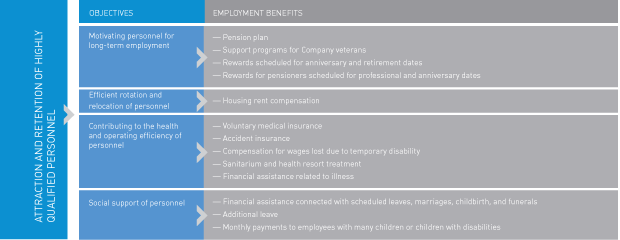
 square km
square km